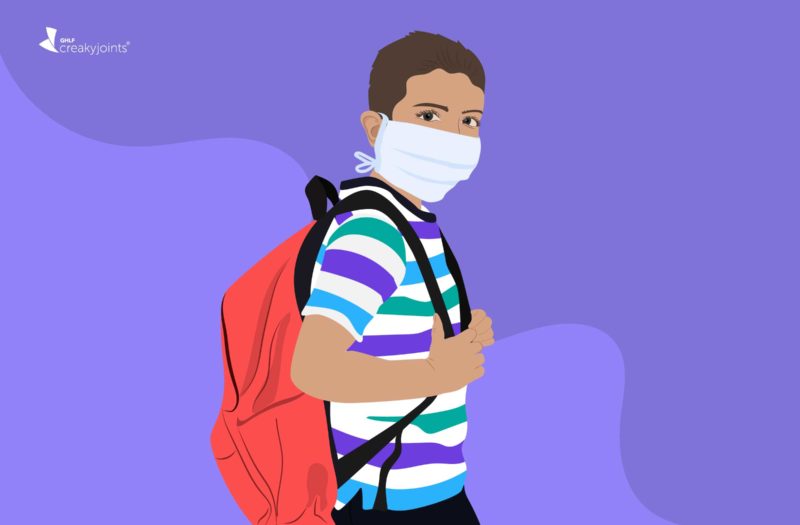Learn more about our FREE COVID-19 Patient Support Program for chronic illness patients and their loved ones.
Figuring out how to best manage a chronic condition in the midst of a pandemic is hard for everyone, which is why various medical organizations have released statements aimed at helping patients stay healthy during the past few months.
In April, the American College of Rheumatology (ACR) released clinical guidance for how to treat adult rheumatology patients in the context of COVID-19. Now the group has issued information regarding how to best care for children with rheumatic disease.
Overall, the guidance is somewhat similar to what the ACR previously outlined for adult rheumatology patients, but there are a few important distinctions.
Preventive measures
As with adults, children with rheumatic disease may be at high risk of developing complications related to COVID-19, so families should take extra care to practice good hand hygiene, keep faces covered in public, and maintain social distancing from others in order to reduce the chances of contracting the virus.
Medication use
The ACR advises that children who do not have COVID-19 continue with their current medication regimen. The ACR specifically notes that kids using NSAIDs, hydroxychloroquine, colchicine, disease-modifying drugs such as methotrexate, and/or biologics to control their condition can keep doing so; glucocorticoids may also be continued.
As with adults, children who contract COVID-19 should temporarily stop using traditional disease-modifying drugs and most biologics because these medications suppress the immune system and could make it harder for them to combat the virus. However, children who test positive for COVID-19 but don’t have any symptoms can keep using these medications.
Drugs that inhibit immune system proteins called interleukins (IL-1 or IL-6) may be continued in both groups. Interestingly, these type of medications are being used to treat some coronavirus patients (who don’t have rheumatic disease) and are less likely to be detrimental to the immune system.
Children who have COVID-19 and are using glucocorticoids can continue doing so, but providers should use the lowest effective dose.
Check-ups and vaccinations
Regular monitoring of a child’s rheumatic disease still important, but during the pandemic the ACR is encouraging providers to rely on telehealth as much as possible.
Children who have been stable for a while on their current treatment may be able to come in for lab testing less frequently. Those whose disease is not well-controlled, however, should continue with regularly scheduled lab tests, and children who are at high risk for uveitis (eye inflammation) should still be examined by an ophthalmologist in person.
One very important note the ACR included is that children with rheumatic disease should remain current on routine childhood vaccinations, including the flu vaccine. Ask your child’s rheumatologist if you’re unsure about when vaccines should be administered or if certain ones are not safe to get due to a medication your child is taking.
The ACR also notes that providers should keep an eye out for mental health issues in both pediatric patients and their caregivers, as the stress and isolation of the pandemic has led to a rise in depression and anxiety.
Get Free Coronavirus Support for Chronic Illness Patients
Join the Global Healthy Living Foundation’s free COVID-19 Support Program for chronic illness patients and their families. We will be providing updated information, community support, and other resources tailored specifically to your health and safety. Join now.
COVID-19 Clinical Guidance for Pediatric Patients with Rheumatic Disease. American College of Rheumatology. June 17, 2020. https://www.rheumatology.org/Portals/0/Files/COVID-19-Clinical-Guidance-Summary-for-Pediatric-Patients-with-Rheumatic-Disease.pdf






